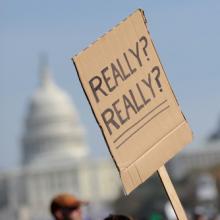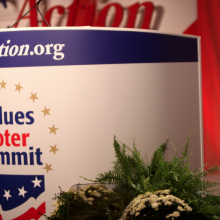Politics
"Did you think I’d forgotten you? Perhaps you hoped I had. Don’t waste a breath mourning ... For those of us climbing to the top of the food chain there can be no mercy. There is but one rule. Hunt or be hunted." - Francis Underwood
So ends the Shakespearean soliloquy at the end of the first episode of House of Card's highly anticipated second season.
Underwood lives by a very clear code of ethics: Get to the top and do whatever is necessary to achieve that goal. For him, the end always justifies the means. And so, although it certainly made me wince to see what happens in Season 2's opening episode, I was left in awe at the show’s brutal honesty of what a life purely committed to power potentially looks like.
Some scenes perhaps strike us viewers as far from reality (Washington can't really be that bad, can it?!?), but other vignettes are far more plausible. Consider Underwood’s commendation of a congresswoman for making the cold, calculated decision to “do what needed to be done” by wiping out entire villages with missile strikes.
Her “ruthless pragmatism” merely makes Underwood smirk.
A couple years ago, a survey found that one in five Americans don’t identify with any religion. For Americans under 30, the number was far higher – more like one third. This report is being cited constantly throughout the religious-nonprofit world. In many quarters, there seems to be a deep sense of shock at the decline in religious membership.
Me? I’m not surprised at all. What does surprise me is our failure to see that affiliation with a traditional, God-centered religion is no longer the primary way that many Americans express their deeply rooted need for faith. We humans are relentlessly religious animals, and post-modern America is no exception. We’re just embracing a different kind of faith.
“I knew from the beginning that as a woman, an older woman, in a group of ministers who are accustomed to having women largely as supporters, there was no place for me to come into a leadership role. The competition wasn’t worth it.”
These are the words Ella Baker spoke regarding her decision to leave the Southern Christian Leadership Conference, SCLC, in 1958. Baker was one of the core founders of this organization. Yet, her male colleagues only recognized her competence and expertise to a limit. The “preacher’s club” selected Rev. Wyatt Tee Walker to replace Baker at the helm. Due to this prevailing patriarchy and what she deemed a focus on “mass rallies and grand exhortations by ministers without follow-up,” Baker left the SCLC. She chose to go her own womanly way.
We make decisions every day. Life’s twenty-four-hour cycle is filled with choices. We contemplate what we will wear. We ponder breakfast selections. Will it be the bagel with cream cheese or a caramel macchiato with soy? Should I watch Mad Men, Scandal, or go to bed early? Do I call or just send a text or email? Our daily lives are replete with routine choices.
However, beyond these commonplace decisions are those personal, communal, and national selections that will have an impact on our lives years from now.
Sunday’s Super Bowl was dubbed by some as the “pot bowl,” as the Denver Broncos and Seattle Seahawks hail from the two states where fans can soon get marijuana as easily as they can get pizza. As public opinion has shifted in support of legalized marijuana, religious leaders are wrestling over competing interests, including high prison rates and legislating morality.
According to a 2013 survey from the Public Religion Research Institute, 58 percent of white mainline Protestants and 54 percent of black Protestants favor legalizing the use of marijuana. On the other side, nearly seven-in-10 (69 percent) white evangelical Protestants oppose it.
Catholics appear to be the most divided Christian group, with 48 percent favoring legalization and 50 percent opposing it. Opinions on how states should handle those who possess or sell marijuana varies among Christian leaders.
WHEN MOST PEOPLE remember George McGovern, the longtime South Dakota senator who passed away in 2012, they probably don’t think first of his evangelical Christian background or see him as a model for evangelicals today.
But McGovern, the Democratic nominee who ran against President Richard Nixon in 1972, actually serves as a worthy exemplar of evangelically rooted social action.
The source of McGovern’s progressive and moral political views may be surprising to some. He was a son of the evangelical church. His father, Rev. Joseph McGovern, was an ordained minister of the Wesleyan Methodist Church (now the Wesleyan Church). It was founded in 1843 as a protest movement against the larger Methodist Episcopal Church. Simply put, they thought slavery sinful and left the denomination to make clear their moral opposition to the “peculiar institution.”
George McGovern enjoyed a good relationship with his father. His childhood was shaped by the rhythms of church life—three or four services on Sunday, prayer meeting on Wednesday night, and daily prayer and Bible readings. The annual family vacation was a two-week campout at nearby Mitchell Holiness Campground. Revival services were conducted nightly.
It’s the end of the year and, as always, a great time to reflect on what has happened over the past 12 months. I’ve been blessed to have so many talented and diverse writers share their voices and views alongside me on the God’s Politics blog. I want to take this opportunity to share some of my favorite posts from this past year with you, in no particular order.
Faith
We had so many great posts this year that explored the different facets of our faith. If you haven’t read them yet, make sure you look at:
What Good is a Ph.D. for reading the Bible? by Rev. Dr. Guy Nave
Five Things That Are Holding Christianity Back by Christian Piatt
10 reasons Why Men Should Not Be Ordained For Ministry by Eugene Cho
Women and Girls
Since the 1970s, Sojourners has been committed to resisting sexism in all its forms, while affirming the integrity and equality of women and men in the church and in the larger world. This year we’ve been even more intentional about looking at these topics through our blog and magazine.
To join Jim Wallis in prayer and fasting, click here.
I was grateful to be at the beginning of the Fast for Families on November 12. Courageous leaders from many communities were making an incredible sacrifice to remind our leaders what is really at stake in the fight for immigration reform. It was an honor to commission the core fasters, such as my Sojourners’ colleague Lisa Sharon Harper and Eliseo Medina, a veteran organizer and a disciple of Cesar Chavez, by placing crosses around their necks as they began abstaining from food.
After 22 days, the core fasters had grown weak, nearing the point of medical danger. When they decided to pass the fast to a new group, I was humbled to join the effort this way. On Tuesday, in the shadow of the U.S. Capitol, I received the cross from Eliseo that I had given to him three weeks before.
At Tuesday’s ceremony, each of us shared why we were committing to this discipline and willing to subsist only on water for various lengths of time.
Brace yourselves. The calendar has turned over to December, which means that the inevitable discussion on the “War on Christmas” will soon see it’s opening salvo for 2013.
It is inevitable. There will be an outrage by a prominent figure about how we have lost our moral fabric because as someone was buying gifts with money they don’t have to impress people that they don’t always like, the cashier will commit the unthinkable sin of wishing us a “Happy Holidays” instead of “Merry Christmas.”
There will be gnashing of teeth as a town or city somewhere will have a “Holiday Parade” rather than a “Christmas Parade,” as Tulsa had done several years ago. (The parade was subsequently boycotted by one of it’s senators.)
The chorus of those who would profess to be Christians will shout that the “Political Correctness Police” have overstepped yet another boundary and that we should not take the “Christ out of Christmas” as the batch of perceived slights against Christendom freshly reveal themselves for this holiday season.
As a person who would say that Jesus is the most important thing in my life, who has devoted my life to the service of God’s Kingdom, and spends all of my waking moments trying be faithful to that devotion, I have to ask: “What exactly do we mean by putting the ‘Christ back in Christmas'?”
As a law extending workplace protection to gay, bisexual, and transgender workers makes its way through the Senate this week, there’s a shift in the political air: Arguments that stand purely on religious grounds are no longer holding the same degree of political sway they once did.
The rhetoric from Republican and conservative opponents of the Employment Non-Discrimination Act is moving away from the morality of the bedroom and into the business sphere. More politicians are fighting ENDA as a bad economic move, not as a break with the Bible.
ENDA would “increase frivolous litigation and cost American jobs, especially small business jobs,” Speaker John A. Boehner said in a statement released Monday, which made clear the Senate bill is dead on arrival in the GOP-controlled House.
For many, including myself, the past few weeks have been discouraging, given the state of our politics and culture and what many vulnerable people across the country are experiencing. But despite the frustration and even grief sometimes I have been reminded of the importance of “saving faith.”
My favorite Twitter response last week said this, “If all American Christians behaved as you do, I wouldn’t have to be such a huge a**hole of an atheist.” (Edits mine.) It came in response to a column I wrote about the new film, 12 Years A Slave (see it if you haven’t yet!), the continuing realities of racism in America that we still tolerate, and the need for churches to provide leadership in the changing demographics of the country by becoming the multiracial faith communities we were intended to be.
The week before saw many of faith leaders, pastors, and young people out in the rain at the U.S. Capitol during the government shutdown in a “Faithful Filibuster,” reading each day through the 2,000 verses in the Bible that speak of how we should treat the poor and vulnerable. One of those nights a family friend, the father of one of the boys I have coached in Little League baseball, came over to our house. He said, “You know I am an atheist, but I really admire what you are doing at the Capitol — that’s what Christians ought to be doing.”
Right after the government shutdown ended, Sojourners had our annual staff orientation. The program included each staff member telling their story of when and why they came to join us. Listening carefully, I was struck by how many Sojourners staffers recalled times in their lives when they were about to lose their faith, but rediscovered it after stumbling upon Sojourners. In my remarks to them that day, I also told stories of a few of the legion of people who have told me over the years of how they had lost or were about to lose their faith until they heard the messages about a faith that does justice.
It has all reminded me again how Sojourners began.
While it's not uncommon to hear the terms "Tea Party" and "libertarian" uttered in the same descriptor, a new survey shows the gap between the two movements. According to the new American Values Survey, an annual release from the Public Religion Research Institute, a full 61 percent of libertarians do not consider themselves part of the Tea Party.
“While conventional wisdom has assumed that the Tea Party movement is fueled by libertarian convictions, most libertarians see themselves as outside of the Tea Party movement. Notably, libertarians are also half as likely as those who identify with the Tea Party movement to see themselves as part of the older Christian right movement," said Dr. Robert P. Jones, CEO of PRRI, in a news release.
In fact, only one in five libertarians claim affiliation with the religious right or conservative Christianity — a claim that more than half of Tea Party adherents would make.
"They pass their days on earth, but they are citizens of heaven. They obey the prescribed laws, and at the same time surpass the laws by their lives."
The above is from a second-century letter to a Roman official has been making the rounds again. It’s been critiqued and analyzed by theologians and pastors alike. Suddenly relevant, the letter to Diognetus is an apologetic, an explanation if you will, of what it meant in the eyes of one writer to be a Christian in that day.
The letter is also an attempt to explain what it means for a Christian to be a citizen of an empire. The author wrote of loyalty, perseverance, and faithfulness, of what it means to be a citizen of heaven above and beyond any other citizenship.
It’s an uncommon rhetoric in our day, to be certain.
A curious early document, the author does not point to scripture as an authority. It’s too soon for epistles and canons. Still, I cannot help but wonder if Jeremiah’s words weren’t somehow in the mix, if the story of Jesus and the ten lepers weren’t in there too.
Heal society’s castoffs and then compel that same society to make peace with those they shun.
Work for the welfare of the place you live no matter what that place may be.
The letter reflects this venerable wisdom.
I was talking to my wife, Amy, today about the news that Speaker John Boehner has requested movement from his party toward a temporary increase of the United States government debt ceiling.
The shutdown in itself is problematic enough. Our leaders have willfully put about a million people out of work while they haggle about policy that has already been put into law. The cost of their standoff to the United States economy is a loss of about $1.6 billion a week in economic output. And it’s more than a little bit ironic that this is being done on the watch of a Congress that supposedly has its first priority as jobs and economic growth.
However, all of this pales in comparison to the potential damage that would ripple throughout the global economy if we were to default on our debt. Because so many markets in the world peg their valuation system to the American dollar, and because so many exchanges use our currency as their monetary system, the prospect of the credibility of our money losing its footing in a potentially irreparable way could be nothing short of catastrophic worldwide.
“We should just fire them all," said Amy. “Just clean house and start fresh.”
The thing is, although this is a sentiment I hear on nearly a daily basis, and I've heard it over the course of many years, very little of substance seems to change when it comes to who represents us in Washington, D.C.
Jim Wallis sat down to discuss the government shutdown. His conclusion? It's unbiblical.
AS FIGHTS ABOUT the budget and other economic issues are again riveting the nation’s capital, the rest of the country yawns. Possible government shutdowns, threats to default on our nation’s debt, and proposals to decimate food assistance for struggling Americans seem to be business as usual in Washington, D.C. These budget battles have become so frequent that it is tempting to dismiss it all as political posturing. But that would be a mistake.
The biggest challenge facing Congress should be a non-issue. The debt ceiling is simply the amount of debt the U.S. is legally allowed to hold. It is about paying off the bills that Congress has already incurred from past appropriations—not about giving permission for new government spending, as many people falsely assume. Congress has raised it nearly 100 times since the end of World War II, but it only recently became a political football. Because the consequences of not raising the debt ceiling and defaulting on our nation’s obligations could be catastrophic, some leaders have tried to leverage it for political gain. After the country came close enough to a default in 2011 to receive a credit downgrade, President Obama has responsibly refused to negotiate over raising it. His assumption is that GOP leaders in Congress wouldn’t throw the economy off the cliff for their own political gain. The American people are left watching this game of chicken and hoping somebody blinks.
While this is clearly a partisan game, the stakes couldn’t be higher. The U.S. has always honored its debts. Should the country default, the market turmoil and long-term effects could be catastrophic for the global economy. Domestically, it could throw the U.S. back into recession.
I have been literally disgusted at how “politics” has dominated the media’s response and coverage of the Syria crisis. Millions of lives are at stake, as is the security of one of the most critical regions of the world. But all many of our media pundits can talk about is how this affects politics — i.e., how this could weaken President Obama’s second term or what this might mean for Obamacare.
I heard the same media blathering when I was in London last week when the Syria chemical weapons crisis broke through. “Does the vote in Parliament hurt the Prime Minister and help his opposition?” “Is the Labor Party now up, and the Tory down?”
Who cares?!
I am an evangelical.
But what does that label even mean anymore?
A few days ago I was sitting around chatting with a few new friends at my Bible college. One of them was a young Canadian and another was a middle-aged former U.S. soldier. We ended up on the topic of politics and how many companies and businesses in the United States give millions to political and social causes and somehow we ended up talking about McDonalds.
My USAF friend made the statement: “McDonalds is terrible because it gives millions to causes and organizations that you [speaking of me] directly oppose: LGBTQ rights campaigns, Planned Parenthood, etc.” I was taken aback because my new friend simply assumed that because everyone in this conversation was an evangelical meant that we all held a certain set of political ideals and social standards. For him — for millions of others — evangelical meant something far more than a theological persuasion. In the midst of this awkward moment, I decided to reveal my identity as a politically progressive/liberal evangelical, which automatically caused an immense amount of tension to arise in our conversation. How could I, a Bible-believing evangelical, possibly support the LGBTQ community’s right to marry? How could I think that Planned Parenthood was doing any good and that President Obama’s plan to rapidly decrease the numbers of abortions in the United States was progress in any way? Let’s just say that the conversation ended on a pretty tense note.
This encounter really caused me to re-reflect on the magnitude that the term evangelical has been hijacked by political and social agendas over the past decade and how a new generation of evangelicals is emerging that does not at all identify with any of the social and political baggage that has come to represent evangelical Christianity. Which brings me back to my original question: What does the label evangelical even mean anymore?
I can tell you this — it doesn’t mean that I am a Republican. It doesn’t mean that I am a Democrat. It doesn’t mean that I am pro- or anti-anything.
Christian conservatives who think Satan is using communism and Islam to bring down America can add a new “adversary” to the list: the Emergent Church movement.
A portion of the upcoming Values Voter Summit in Washington will stray from its usual focus on politics and consider the Emergent Church as one of three “channels the adversary is using to bring America down.” Art Ally, president of The Timothy Plan, a Florida-based mutual fund company devoted to “biblically responsible investing,” will lead the breakout session.
“Why would Satan use Communism? It’s a godless form of government,” said Ally. “Why would Satan use Islam? Same reason. It’s not a religion. It’s a movement to dominate the world under the guise of religion. The Emergent Church plays right into that by weakening further our church community.”

















